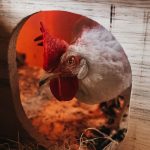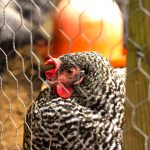Keeping bantam chickens indoors offers numerous advantages for both the birds and their caretakers. The primary benefit is protection from predators such as foxes, raccoons, and raptors, as well as shelter from harsh weather conditions including extreme temperatures and heavy rainfall. These factors significantly contribute to the chickens’ safety and well-being.
Indoor housing also facilitates closer monitoring of the chickens’ health and behavior. This proximity allows for easier observation of any changes in their physical condition or conduct, enabling early detection of potential health issues. Prompt identification of problems can lead to timely veterinary intervention and treatment, ultimately enhancing the chickens’ overall health and lifespan.
Additionally, indoor environments help limit the chickens’ exposure to disease carriers and parasites, reducing the risk of illness transmission.
Table of Contents
- 1 Creating a Safe and Comfortable Indoor Environment for Bantam Chickens
- 2 Feeding and Watering Bantam Chickens Indoors
- 3 Providing Exercise and Mental Stimulation for Bantam Chickens Indoors
- 4 Managing Waste and Odor from Bantam Chickens Indoors
- 5 Health and Veterinary Care for Bantam Chickens Indoors
- 6 Integrating Bantam Chickens into Indoor Living Spaces
- 7 FAQs
Key Takeaways
- Keeping bantam chickens indoors can protect them from predators and extreme weather conditions, ensuring their safety and well-being.
- Creating a safe and comfortable indoor environment for bantam chickens involves providing adequate space, ventilation, and natural light.
- Feeding and watering bantam chickens indoors requires a balanced diet and access to fresh water to maintain their health and vitality.
- Providing exercise and mental stimulation for bantam chickens indoors can be achieved through the use of toys, perches, and interactive activities.
- Managing waste and odor from bantam chickens indoors involves regular cleaning, proper bedding, and the use of odor control products to maintain a clean living space.
Creating a Safe and Comfortable Indoor Environment for Bantam Chickens
Space and Movement
Providing enough space for the chickens to move around freely is crucial for their physical and mental health. A general rule of thumb is to allow at least 2 square feet of space per chicken to ensure they have enough room to roam and exercise.
Ventilation and Air Quality
Proper ventilation is also key in maintaining a healthy indoor environment for bantam chickens. Good air circulation helps in reducing moisture, ammonia, and other airborne pollutants that can negatively impact the chickens’ respiratory health.
Lighting and Temperature Control
Additionally, ensuring adequate lighting and temperature control is important for their comfort and well-being. Natural or artificial light sources should be provided to maintain a regular day-night cycle, while maintaining a comfortable temperature range between 60-75°F (15-24°C) is crucial for their overall health.
Feeding and Watering Bantam Chickens Indoors

Feeding and watering bantam chickens indoors requires careful attention to their dietary needs and access to clean water at all times. When keeping chickens indoors, it is important to provide them with a balanced diet that meets their nutritional requirements. This typically includes a commercial feed specifically formulated for bantam chickens, which provides essential nutrients such as protein, vitamins, and minerals.
Additionally, offering occasional treats such as fruits, vegetables, and mealworms can help in providing variety and mental stimulation for the chickens. In terms of water access, it is crucial to ensure that bantam chickens have constant access to clean and fresh water. Water should be provided in a spill-proof container that is easily accessible to the chickens at all times.
Regularly cleaning and refilling the water container is essential in preventing contamination and ensuring that the chickens remain hydrated throughout the day. Monitoring their water intake is also important, as changes in consumption can indicate potential health issues such as dehydration or illness.
Providing Exercise and Mental Stimulation for Bantam Chickens Indoors
Providing exercise and mental stimulation for bantam chickens indoors is essential for their physical health and overall well-being. While indoor living spaces may limit their ability to roam freely, there are various ways to encourage physical activity and mental stimulation for the chickens. One effective method is to provide them with perches or platforms at different heights within their living space.
This allows them to jump, roost, and exercise their leg muscles, promoting physical activity and overall fitness. In addition to physical exercise, mental stimulation is equally important for bantam chickens kept indoors. This can be achieved by providing them with enrichment activities such as hanging treats or toys that encourage pecking and exploration.
Additionally, introducing novel objects or rearranging their living space from time to time can help in keeping them mentally engaged and stimulated. Another effective way to provide mental stimulation is through interactive toys or puzzles designed specifically for chickens, which can help in preventing boredom and promoting natural behaviors.
Managing Waste and Odor from Bantam Chickens Indoors
Managing waste and odor from bantam chickens kept indoors is crucial for maintaining a clean and healthy living environment for both the chickens and their owners. One effective method of waste management is through the use of absorbent bedding materials such as straw, wood shavings, or hemp bedding. These materials help in absorbing moisture and odor from chicken droppings, making it easier to clean and maintain a fresh living space for the chickens.
Regular cleaning of the indoor living space is also essential in managing waste and odor from bantam chickens. This includes daily removal of soiled bedding, droppings, and spilled feed, as well as periodic deep cleaning of the entire living area. Using natural cleaning products such as vinegar or enzyme-based cleaners can help in effectively removing odors without posing any harm to the chickens.
Additionally, proper ventilation plays a key role in reducing odor buildup by promoting air circulation and removing stale air from the living space.
Health and Veterinary Care for Bantam Chickens Indoors

Regular Health Checks
Regular health checks should be conducted to monitor the chickens’ overall condition, including their weight, appetite, behavior, and physical appearance. Any changes or abnormalities should be promptly addressed by seeking veterinary care to prevent potential health issues from escalating.
Preventive Care Measures
Preventive care measures such as vaccinations, parasite control, and regular deworming are essential in maintaining the health of bantam chickens kept indoors. Vaccinations help in protecting them from common poultry diseases such as Marek’s disease, Newcastle disease, and infectious bronchitis.
Protecting Against Parasites and Diseases
Additionally, implementing a regular deworming schedule and using parasite control products can help in preventing infestations and maintaining the chickens’ overall health.
Integrating Bantam Chickens into Indoor Living Spaces
Integrating bantam chickens into indoor living spaces requires careful planning, consideration of space limitations, and ensuring compatibility with other household members. When introducing bantam chickens into indoor living spaces, it is important to designate a specific area or room that is suitable for their housing needs. This area should be well-ventilated, easily accessible for cleaning, and away from high-traffic areas to minimize stress on the chickens.
Furthermore, it is important to consider the compatibility of bantam chickens with other household pets or family members. Proper introductions should be made to ensure that all parties are comfortable with the new living arrangement. Additionally, providing opportunities for social interaction with the chickens through supervised handling or supervised free-ranging time can help in fostering positive relationships between the chickens and other household members.
In conclusion, keeping bantam chickens indoors can provide numerous benefits for both the chickens and their owners. By creating a safe and comfortable indoor environment, providing proper nutrition and mental stimulation, managing waste and odor effectively, maintaining their health through veterinary care, and integrating them into indoor living spaces thoughtfully, bantam chickens can thrive as beloved members of the household. With careful planning and attention to their needs, indoor bantam chicken keeping can be a rewarding experience for both the chickens and their human companions.
If you’re considering keeping bantam chickens indoors, you may also be interested in learning about how to insulate a chicken coop. This article from Poultry Wizard provides helpful tips for keeping your chickens warm and comfortable during the colder months. Learn more about insulating a chicken coop here.
FAQs
What are bantam chickens?
Bantam chickens are small breeds of chickens, typically about one-fourth to one-fifth the size of standard chicken breeds. They are known for their ornamental and decorative qualities, as well as their friendly and docile nature.
Is it possible to keep bantam chickens indoors?
Yes, it is possible to keep bantam chickens indoors, but it requires careful planning and consideration of their needs for space, ventilation, and cleanliness. Indoor bantam chicken keeping is more common in urban or suburban areas where outdoor space is limited.
What are the benefits of keeping bantam chickens indoors?
Keeping bantam chickens indoors can provide a constant source of fresh eggs, entertainment, and companionship. It also allows for easier monitoring of their health and protection from predators.
What are the challenges of keeping bantam chickens indoors?
Challenges of keeping bantam chickens indoors include managing their waste, providing adequate space and ventilation, and preventing potential damage to indoor surfaces and furnishings. Additionally, proper socialization and mental stimulation are important for indoor bantam chickens.
What are some tips for keeping bantam chickens indoors?
Some tips for keeping bantam chickens indoors include providing a spacious and well-ventilated coop, using appropriate bedding material, maintaining a clean environment, offering a balanced diet, and providing opportunities for exercise and mental stimulation. It’s also important to monitor their health and behavior regularly.
Meet Walter, the feathered-friend fanatic of Florida! Nestled in the sunshine state, Walter struts through life with his feathered companions, clucking his way to happiness. With a coop that’s fancier than a five-star hotel, he’s the Don Juan of the chicken world. When he’s not teaching his hens to do the cha-cha, you’ll find him in a heated debate with his prized rooster, Sir Clucks-a-Lot. Walter’s poultry passion is no yolk; he’s the sunny-side-up guy you never knew you needed in your flock of friends!







